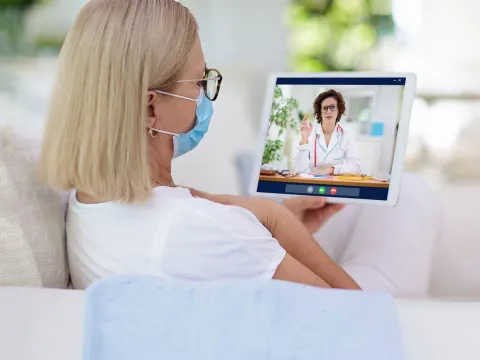- AdventHealth

Thanks to all those who’ve stayed at home and followed guidelines to curb coronavirus, we’ve made progress in slowing the pandemic. Now it’s your turn to put yourself first and continue care that’s been put on hold.
We are once again performing elective procedures, including outpatient surgery and other treatment that requires an overnight stay in the hospital. If you’re considering an elective procedure that helps you get back to living your best life, we’re ready to support you every step of the way.
Rest assured your health and safety are our priority. From enhanced cleaning and sanitation to universal masking and temperature checks, we have extraordinary precautions in place to protect you — so you can worry less and simply focus on healing.
Elective, But Not Necessarily Optional
An elective surgery is a procedure performed for a medical condition that is not immediately urgent or life-threatening. While conditions that require an elective procedure may be painful or limit function, treatment is considered elective because it can be scheduled in advance.
The fact that surgery doesn’t have to be performed immediately doesn’t mean that your condition isn’t important or that surgery can wait indefinitely. Some elective surgeries may treat a serious condition such as cancer. Or, you may need an elective procedure such as a knee or hip replacement, shockwave therapy for kidney stones, skin cancer removal, sports-related orthopedic surgery, hysterectomy or hernia repair.
Getting the Green Light
The Centers for Disease Control and Prevention (CDC) recommended postponing routine visits or elective procedures earlier this year to prevent the spread of coronavirus. But now is the time to start talking with your doctor about getting the treatment you need to live a full and active life. The CDC and many states lifted restrictions on elective procedures in May, recognizing that people were going without the important care they need.
Preparing for Surgery
Your surgeon’s office will provide you with a list of things to do — and not do — prior to your surgery. This might include pre-surgical testing, diet and exercise recommendations, directions about current medications you may take and more. It’s important to follow these instructions carefully.
To help prevent surgical site infections, the CDC advises:
-
Discuss your health issues, such as diabetes, with your surgeon
-
Don’t shave near where you will have surgery
-
Follow your surgeon’s directions for cleaning your skin before your surgery
-
Quit smoking
New Pre-Surgery Precautions
Once you and your doctor schedule your elective procedure, you’ll notice some new safety measures.
-
We will call you to schedule a COVID-19 test before your procedure or surgery. Your physician may recommend that you quarantine for several days before your procedure. If you test positive, your procedure will be rescheduled.
-
You’ll be asked if you have symptoms of COVID-19, or if you have come into contact with someone who has the virus.
-
Visitors will be limited. Many facilities allow one guest per day, but check with your local AdventHealth facility to learn more about the policy.
It’s crucial to participate in these screening processes and to be honest in answering questions — for your safety and the safety of your health care team.
Day of Surgery Precautions
Your care team will provide detailed information and instructions about what to do and what to expect the day of your elective procedure. While some details will vary depending on your unique treatment plan, we have strict protocols in place to protect you. Examples of safety precautions that you’ll notice include:
-
Seating is spaced to allow for social distancing, and the number of people, including staff, will be limited in treatment areas
-
Hand sanitizer stations will be located in common areas
-
You, along with staff and any visitors, will undergo a temperature check
-
You and everyone else over the age of 2 in the facility will be wearing a required face mask or covering
-
You’ll be screened again for COVID-19 by answering questions about symptoms and exposure to people with the virus
Post-Procedure Precautions
In addition to following your surgeon’s post-surgery care instructions, it’s important to follow the latest guidelines from the CDC, too. You should stay home as much as possible, avoid crowds, maintain social distancing, wear a cloth face covering when not at home and practice good hand hygiene. Taking these actions will help you stay healthy now and in the future.
Helping You Feel Whole
Before, during, and after surgery, our mission is clear: heal the body, ease the mind and lift the spirit. We’re here for heartfelt support and expert guidance as you reclaim your whole health. Learn more about our general surgery services here.


